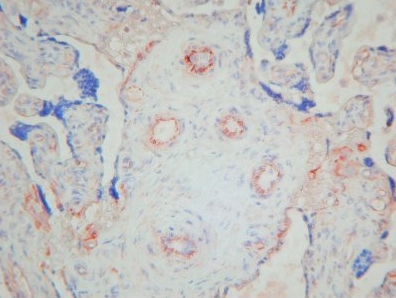Angiogenin (ANG) Mouse Monoclonal Antibody [Clone ID: MANG1]
CAT#: BM4113
Angiogenin (ANG) mouse monoclonal antibody, clone MANG1, Supernatant
Need it in bulk or conjugated?
Get a free quote
CNY 9,300.00
货期*
5周
规格
Specifications
| Product Data | |
| Clone Name | MANG1 |
| Applications | ELISA, IHC |
| Recommend Dilution | Immunohistochemistry on Frozen Sections: 5 µg/ml (1/60) Immunohistochemistry on Paraffin Sections: 10 µg/ml (1/30). Proteinase K pretreatment for antigen retrieval is recommended. Has been described to work in ELISA. Recommended Positive Control: Huma Tonsil. |
| Reactivity | Human |
| Host | Mouse |
| Clonality | Monoclonal |
| Immunogen | Recombinant Human Angiogenin. |
| Specificity | This Monoclonal antibody MANG-1 is useful for detecting human angiogenin, a potent vessel inducing basic polypeptide, with a unique ribonucleolytic activity. Antigen Distribution on Tissue Sections: MANG-1 stains single cells on cryostat sections of human tonsil. In Human terminal placenta endothelial cells are stained positive. Angiogenin is a 14.1kD single chain polypeptide of 123 amino acids. MANG-1 is positive on recombinant angiogenin in ELISA. |
| Formulation | PBS, pH 7.2 with 10 mg/ml BSA as a stabilizer and 0.01% Thimerosal as a preservative. State: Supernatant State: Lyophilized Tissue Culture Supernatant |
| Reconstitution Method | Restore with 0.5 ml distilled water. |
| Concentration | 0.3 mg/ml (after reconstitution) |
| Conjugation | Unconjugated |
| Storage Condition | Store the antibody at 2-8°C for one month or (in aliquots) at -20°C for longer. Do not freeze working dilutions Avoid repeated freezing and thawing. |
| Gene Name | angiogenin |
| Database Link | |
| Background | Angiogenin is a member of the ribonuclease superfamily with approximately 35% amino acid sequence identity with pancreatic RNase. Like other members of the ribonuclease superfamily, angiogenin is a cytotoxic agent that can eliminate cellular protein synthesis. Angiogenin causes inhibition of protein synthesis by functioning as a cytotoxic tRNA-specific RNase. Angiogenesis is the formation of blood vessels or capillaries from existing blood vessels due to specific signals. Angiogenin induces the growth of new blood vessels. It stimulates capillary and umbilical vein endothelial cells to produce diacylglycerol and secrete prostacyclin by phospholipase activation. Angiogenin exhibits both angiogenic and non-angiogenic activities and is involved in endothelial cell migration, proliferation, and differentiation. It is produced by a variety of tumor and normal cell types. Cells that express angiogenin include vascular endothelial and smooth muscle cells, fibroblasts, normal colonic epithelium, normal peripheral blood lymphocytes, lung and colonic epithelial tumor cell lines, and primary gastrointestinal adenocarcinomas. Angiogenin is also present in normal human plasma. |
| Synonyms | ANG, RNASE5, Ribonuclease 5 |
| Note | Protocol: Protocol with frozen, ice-cold acetone-fixed sections: The whole procedure is performed at room temperature 1. Wash in PBS 2. Block endogenous peroxidase 3. Wash in PBS 4. Block with 10% normal goat serum in PBS for 30min. in a humid chamber 5. Incubate with primary antibody (dilution see datasheet) for 1h in a humid chamber 6. Wash in PBS 7. Incubate with secondary antibody (peroxidase-conjugated goat anti mouse IgG+IgM (H+L) minimal-cross reaction to human) for 1h in a humid chamber 8. Wash in PBS 9. Incubate with AEC substrate (3-amino-9-ethylcarbazol) for 12min. 10. Wash in PBS 11. Counterstain with Mayer's hemalum Protocol with formalin-fixed, paraffin-embedded sections: The whole procedure is performed at room temperature 1. Deparaffinize and rehydrate tissue section 2. Incubate the tissue section with proteinase K for 7min. 3. Wash in distilled water 4. Block endogenous peroxidase 5. Wash in PBS 6. Block with 10% normal goat serum in PBS for 30min. in a humid chamber 7. Incubate with primary antibody (dilution see datasheet) for 1h in a humid chamber 8. Wash in PBS 9. Incubate with secondary antibody (peroxidase-conjugated goat anti mouse IgG+IgM (H+L) minimal-cross reaction to human) for 1h in a humid chamber 10. Wash in PBS 11. Incubate with AEC substrate (3-amino-9-ethylcarbazol) for 12min. 12. Wash in PBS 13. Counterstain with Mayer's hemalum |
| Reference Data | |
Documents
| Product Manuals |
| FAQs |
| SDS |
Resources
| 抗体相关资料 |
Customer
Reviews
Loading...


 United States
United States
 Germany
Germany
 Japan
Japan
 United Kingdom
United Kingdom
 China
China

